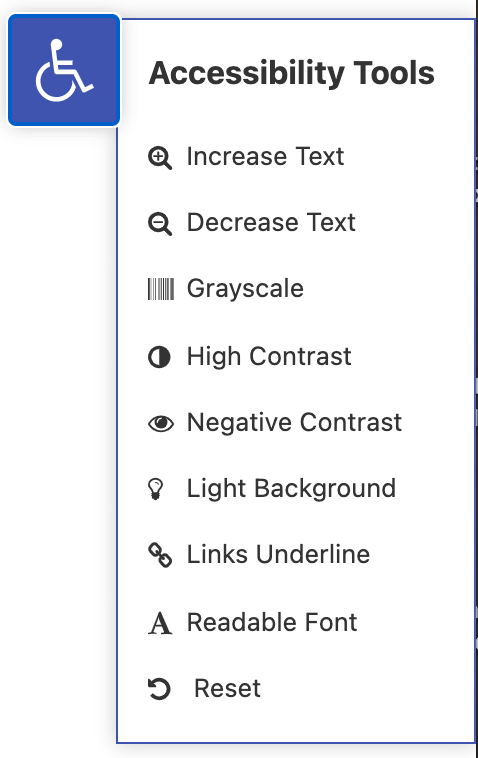What is ADA Compliance?
ADA stands for American with Disabilities Act. Title III of the ADA prohibits any “public accommodation” from denying “full and equal enjoyment” of its services or facilities on the basis of a disability. The Department of Justice (DOJ) published the Americans with Disabilities Act (ADA) Standards for Accessible Design in September 2010. These standards state that all electronic and information technology must be accessible to people with disabilities.
When the Americans with Disabilities Act was written in 1986, the Internet had not yet become a part of daily life. The internet was not included as a consideration back then for ADA requirements, which was intended to remove barriers that would keep disabled individuals from enjoying areas of “public accommodations” like restaurants, sports arenas, and shopping malls. Since the introduction of the Act, society has undergone major changes. Now, people shop online, attend online schools, run their businesses online, and interact online more than in person. But still many are not clear about what the actual requirements are for website ADA compliance. Businesses are now asking questions, if they are now required to accommodate ADA Compliance due to the release of the Americans with Disabilities Act (ADA) Standards for Accessible Design, which the U.S. Department of Justice released in 2010. The standards published, guides companies to offer and maintain sites that people with disabilities can use and access.
Who Is Required To Offer ADA Compliance Websites?
Here is where many small businesses may get confused. In recent years, some interactions with companies offering ADA Guidance Services and/or Website ADA Plugins have contacted a few of my clients offering to assist in ADA Compliance Services, however they added a small scare tactic to their sales pitch in order to intimidate their potential customers into using their services. The hook in their sales pitch towards the small businesses they were contacting is that they are hoping the company does not know the actual legal requirements for ADA compliance and allows the intimidation factor to influence their decision to use the services offered. These companies made good points as to why offering ADA compliance is good for business, and it does help to have a fully accessible website for the disabled, however they end off their sales pitch by saying things like, “If you do not have our service, you may get sued.” This is the red flag, and makes these companies unprofessional and even scammers! If these companies were truly knowledgeable in the actual law of the Americans with Disabilities Act, they would know what companies are required by law to offer these services and which are exempt. So they scare small businesses who are legally exempt into using their services, plugins, and some even paying top dollar in order not to deal with potential lawsuits. This is occurring all too often and is a dishonest practice. So the question is, who does this law really affect when it comes to offering ADA Compliance? Let’s see the required list from the actual ADA Compliance website:
- Businesses operating for the benefit of the public. (Example: Restaurants, Etc.)
- Private employers with 15 or more employees. (Small Businesses Are Exempt.)
- Americans with disabilities and their friends, families, and caregivers.
- All state and local government agencies.
- Ref: https://www.interactiveaccessibility.com/services/ada-compliance
So small businesses with under 15 employees are legally exempt from this compliance to be required. However you can add a basic ADA plugin to your website in order make your site accessible to the disabled. It's not discouraged to offer these website abilities. It can however be very pricey when considering the Levels of ADA, like levels A, AA, or AAA Compliances. (Levels Ref: https://www.w3.org/WAI/WCAG21/quickref/?versions=2.0¤tsidebar=%23col_customize&levels=a%2Caaa#principle2)
 But small businesses can offer other options, like free basic plugin tools offered that would offer the disabled functions like: Increase Text, Decrease Text, Grayscale, High Contrast, Negative Contrast, Light Background, Links Underline, Readable Font. (Ref: https://pojo.me/plugins/accessibility/)
But small businesses can offer other options, like free basic plugin tools offered that would offer the disabled functions like: Increase Text, Decrease Text, Grayscale, High Contrast, Negative Contrast, Light Background, Links Underline, Readable Font. (Ref: https://pojo.me/plugins/accessibility/)
Other basic requirements are to make sure all your images on your website contain alt tags. The required alt attribute specifies an alternate text for an image, if the image cannot be displayed the alt tag text is displayed, this also helps the visually impared hear the text being read on screen. (Ref: https://www.w3schools.com/tags/att_img_alt.asp)
Another option for small businesses that are exempt is to offer an “Accessibility Statement Page” letting the disabled know if they have issues with your website to contact your office for assistance. This has been done by international multi-billion dollar companies such as McDonalds. (Ref: https://www.mcdonalds.com/us/en-us/accessibility.html). Their entire website has no visual accessible tools for the disabled, but offers a legal statement to contact their support if assistance is required to browse their website.
So this article is to let small businesses who may or may have not been contacted by companies offering ADA services, that having these services are not discouraged in the least, but if a scare tactic is used in the sales pitch, you should question the company at its fullest, as companies under 15 employees are exempt legally.
*Disclaimer: this article is not intended in any way to be legal advice. We highly recommend speaking to an attorney if you have any legal concerns.
Sources






 But small businesses can offer other options, like free basic plugin tools offered that would offer the disabled functions like: Increase Text, Decrease Text, Grayscale, High Contrast, Negative Contrast, Light Background, Links Underline, Readable Font. (Ref:
But small businesses can offer other options, like free basic plugin tools offered that would offer the disabled functions like: Increase Text, Decrease Text, Grayscale, High Contrast, Negative Contrast, Light Background, Links Underline, Readable Font. (Ref: